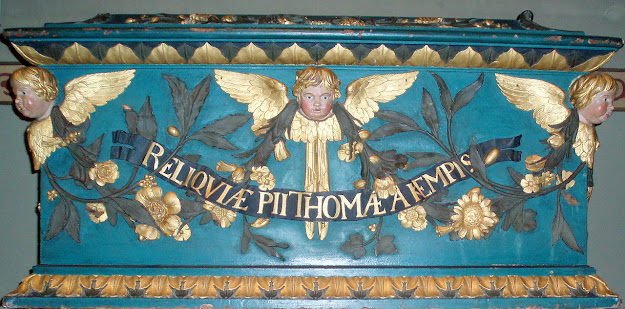In Celebration of Imitation
Edited by Bp. Joseph Boyd (Ancient Church of the West)
Today the Anglican calendar commemorates Thomas à Kempis!
Thomas was born in Kempen in the Rhineland. His surname at birth was Hemerken (or Hammerlein), meaning the family's profession, "little hammer," Latinized into "Malleolus." His father, Johann, was a blacksmith and his mother, Gertrud, was a schoolmistress.
In 1392, Thomas followed his brother, Johann, to Deventer in the Netherlands in order to attend the noted Latin school there. While attending this school, Thomas encountered the Brethren of the Common Life, followers of Gerard Groote's Modern Devotion. He attended school in Deventer from 1392 to 1399.
After leaving school, Thomas went to the nearby city of Zwolle to visit his brother again, after Johann had become the prior of the Monastery of Mount St. Agnes there. This community was one of the canons regular of the Congregation of Windesheim, founded by disciples of Groote in order to provide a way of life more in keeping with the norms of monastic life of the period. Thomas himself entered Mount St. Agnes in 1406. He was not ordained a priest, however, until almost a decade later. He became a prolific copyist and writer. Thomas received Holy Orders in 1413 and was made sub-prior of the monastery in 1429.
 |
| Thomas, Meditating on a Hill Near His Monastery |
His first tenure of office as subprior was interrupted by the exile of the community from Agnetenberg (1429). A dispute had arisen in connection with an appointment to the vacant See of Utrecht. Pope Martin V rejected the nomination of Bishop-elect Rudolf van Diepholt, and imposed an interdict. The Canons remained in exile in observance of the interdict until the question was settled (1432). During this time, Thomas was sent to Arnhem to care for his ailing brother. He remained there until his brother died in November, 1432.
Otherwise, Thomas spent his time between devotional exercises in writing and in copying manuscripts. He copied the Bible no fewer than four times, one of the copies being preserved at Darmstadt, Germany, in five volumes. In its teachings he was widely read and his works abound with biblical quotations, especially from the New Testament.
As subprior he was charged with instructing novices, and in that capacity wrote four booklets between 1420 and 1427, later collected and named after the title of the first chapter of the first booklet: The Imitation of Christ. Thomas More said it was one of the three books everybody ought to own. Despite the anti-Catholicism of the Reformation, his book was extremely important to many of the Reformers.
“If God were our one and only desire we would not be so easily upset when our opinions do not find outside acceptance.”"As long as you live, you will be subject to change, whether you will it or not - now glad, now sorrowful; now pleased, now displeased; now devout, now undevout; now vigorous, now slothful; now gloomy, now merry. But a wise man who is well taught in spiritual labor stands unshaken in all such things, and heeds little what he feels, or from what side the wind of instability blows.""My child, I am the Lord Who gives strength in the day of trouble. Come to Me when all is not well with you. Your tardiness in turning to prayer is the greatest obstacle to heavenly consolation, for before you pray earnestly to Me you first seek many comforts and take pleasure in outward things. Thus, all things are of little profit to you until you realize that I am the one Who saves those who trust in Me, and that outside of Me there is no worth-while help, or any useful counsel or lasting remedy.""Not everyone can have the same devotion. One exactly suits this person, another that. Different exercises, likewise, are suitable for different times, some for feast days and some again for weekdays. In time of temptation we need certain devotions. For days of rest and peace we need others. Some are suitable when we are sad, others when we are joyful in the Lord.""It is not really a small thing when in small things we resist self."
Thomas died near Zwolle in 1471, and his relics are venerated to this day, despite his lack of formal canonization as a saint. His love of simplicity and his desire for a personal relationship with Jesus Christ formed millions of Christians, and still exerts a great influence today, despite the passing of almost half a millennia.
 |
| The Relics of an Unrecognized Saint |
(Some Text Edited from Wikisource)



Comments
Post a Comment